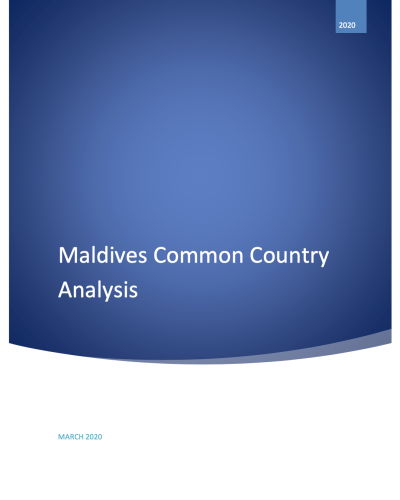Maldives Common Country Analysis

Following the recent reforms repositioning the UN development system, the UN system in Maldives’ is developing a Sustainable Development Cooperation Framework (UNSDCF) as its planning and implementation instrument in support of the 2030 Agenda for Sustainable Development (2030 Agenda), with a commitment to leave no one behind and in line with human rights and other international standards and obligations. It will outline the UN’s collective response to national development priorities and the Sustainable Development Goals (SDGs) for the period 2021-2025.
The UN Maldives’ new UNSDCF will support economic and social transformation, and the development of an equal, inclusive and peaceful society through sustainable development strategies specific to Maldives’ country context and leveraging funding for financing for achieving the SDGs.
The United Nations Country Team (UNCT) in Maldives has launched the process of preparation and formulation of the new UNSDCF with a final independent evaluation of the ongoing 2016-2020 UNDAF and this Common Country Analysis (CCA). The CCA is the UN system’s independent, impartial and collective assessment and analysis of the country situation, providing insights to guide the development of the new UNSDCF.
The UNSDCF will be centred around a set of priority areas where the UN will contribute to Maldives’ development process over the next five years. These priority areas will be identified, in consultation with the Government and other stakeholders based upon the findings of this CCA, the UN’s cooperative advantages vis- à-vis the Government and other development actors and be aligned with the Governments Strategic Action Plan 2019-2023 (SAP).
The CCA articulates the context, opportunities and challenges facing the Maldives, encompassing sustainable development, human rights, gender equality, peace and security, and humanitarian perspectives. The CCA has been largely informed by the situational analyses that the Government and members of the UNCT have undertaken. These provide background information on past targets, achievements and challenges as well as taking stock of remaining challenges.
The CCA follows the conceptual framework and structure set out in the current UNDSG guidance. The format has been adapted slightly to reflect the organisation of nationally available information.
This CCA has been largely based on secondary data from Government, national, international and UN sources. Additional primary information gathering to fill in gaps has been undertaken by the UN agencies in partnership with governmental and non-governmental actors, leveraging UN system convening power to consult and engage with the government and other stakeholders, including the most vulnerable and marginalized people and their organizations. Review of existing sources (assessment, publications, research findings, analytical tools, big data, national surveys,) of disaggregated data (sex, income, age and other factors) both at national and global level was also undertaken with an aim of adding value while building partnerships with key stakeholders.
Pertinent information has been obtained from a range of national sources, as well as a wide range of studies and reports of UN agencies, the World Bank, IMF, IDB, bilateral organisations and others. This review has included specific studies on critical areas such as policies and programmes to mainstream SDGs and climate change issues, generating employment (especially of youth), human rights and gender equality.

















